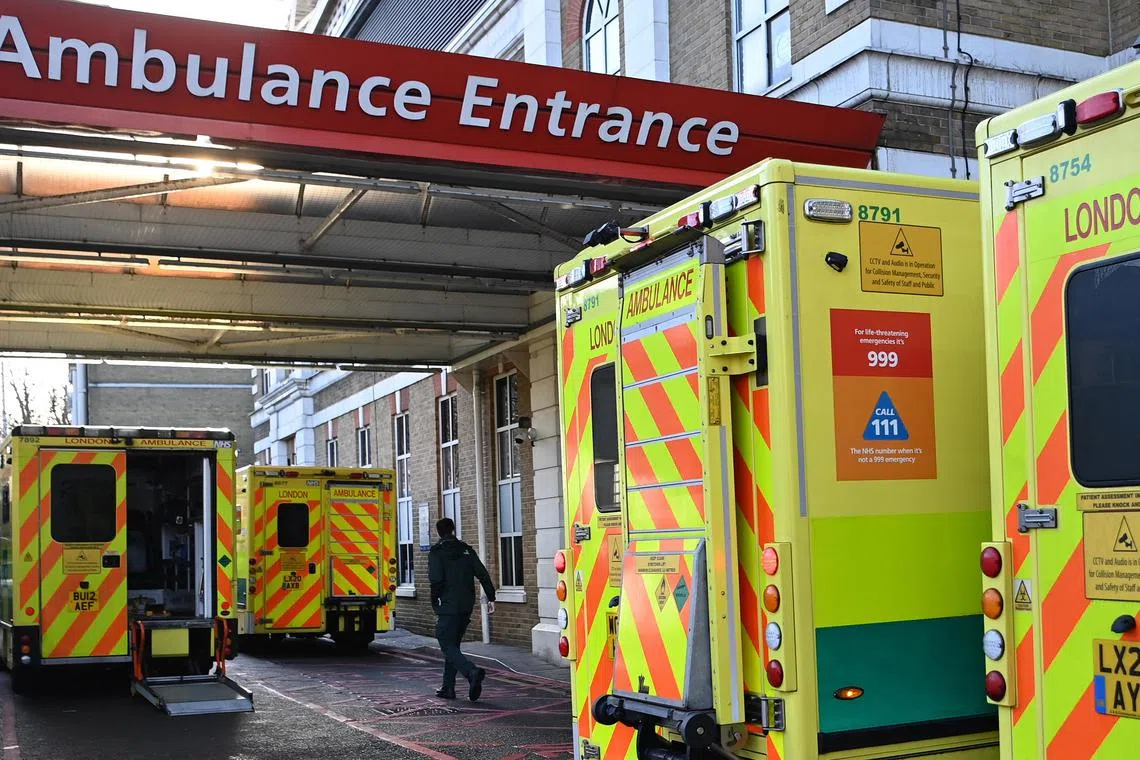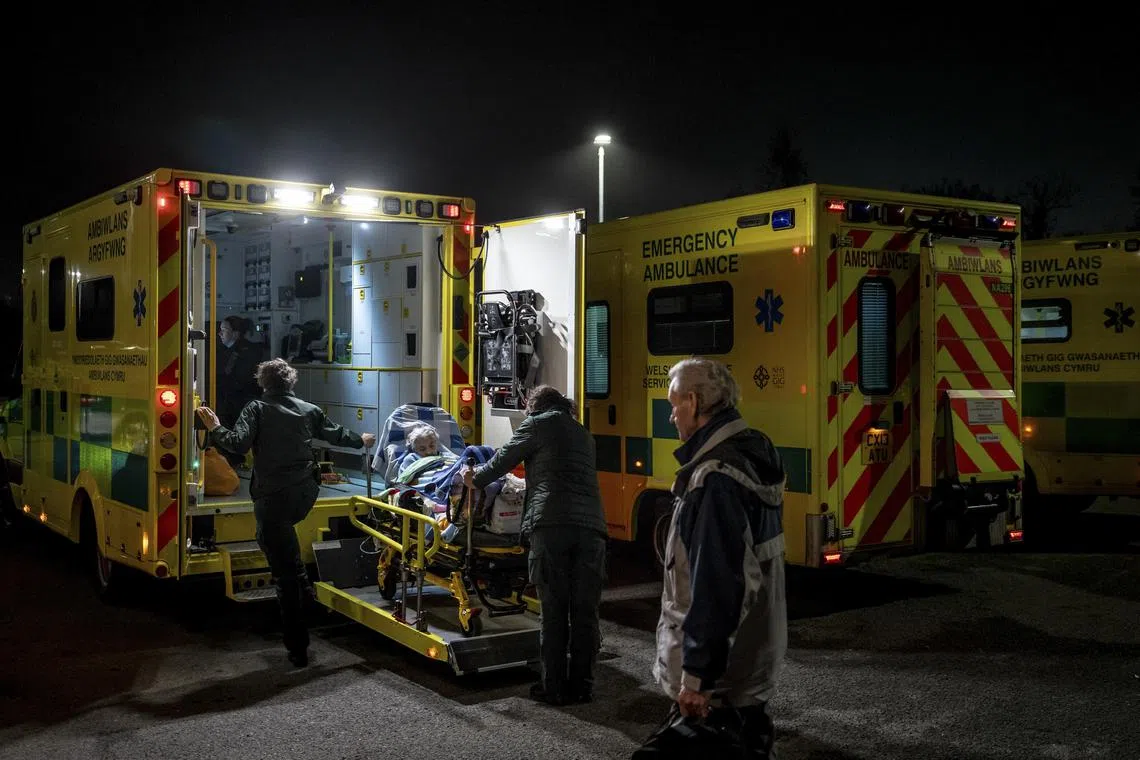Thousands of UK ambulance staff strike as public urged to use ‘common sense’
Sign up now: Get ST's newsletters delivered to your inbox

Employees across the UK economy are demanding salary rises in the face of decades-high inflation.
PHOTO: EPA-EFE
Follow topic:
LONDON - Thousands of ambulance workers in England and Wales walked out over pay on Wednesday, increasing the strain on a state-funded health service a day after nurses went on strike, as the government advised the public to avoid taking risks.
The government said the “deeply regrettable” strike would result in fewer ambulances on the road, with only the most urgent life-threatening cases such as heart attacks prioritised.
Health and Social Care Secretary Steve Barclay said the public should “just use their common sense”, adding that the action came when the National Health Service (NHS) was “already facing very significant pressure”.
“That’s the point at which the trade unions have chosen to take industrial action, and in doing so, they haven’t been willing to work with us to agree national exemptions in terms of covering all of the category one, category two, life-threatening and emergency calls,” he told the BBC.
“Ambulance unions have made a conscious choice to inflict harm on patients,” Mr Barclay also wrote in the Telegraph newspaper.
Ms Christina McAnea, general secretary of Unison, said she was “utterly shocked” by Mr Barclay’s comments, adding that he knew detailed plans were in place in local areas. “These accusations from the SoS (Secretary of State) are a distraction from the government’s own failings and their refusal to constructively resolve this dispute,” she said.
Her counterpart at Unite, Ms Sharon Graham, said all category one calls would be answered, while category two calls, which include conditions like strokes, would be assessed by healthcare workers.
“This strike did not need to happen,” she told the BBC. “(The government) needs to get back to the negotiating table so we can get a proper pay rise for these workers and everyone can go back to work.”
The third union, the GMB, has said pay in the health service has fallen 17 per cent in real terms since 2010, while demand for ambulances has risen 77 per cent in the same period.
An independent pay review body has awarded over one million NHS workers a pay rise of at least £1,400 (S$2,300), equating to an increase of at least 4 per cent for most ambulance staff, according to the government. Unions have asked for a rise above inflation, which was 10.7 per cent on the consumer price measure in November.
The NHS Confederation, which represents national health service organisations, said the strike risked patient safety.
“We never want to alarm people but we have reached the stage where our leaders feel it’s necessary to say they cannot guarantee patient safety,” said Mr Matthew Taylor, head of the NHS Confederation which represents services including ambulance trusts in England and Wales.
“We’re entering into a very dangerous time and this is why we’re upping even more our call to the government and to the trade unions to try to find a way of solving this dispute and helping us get through the winter,” he told the BBC.
London’s biggest hospital group said “people giving birth will need to plan how they come into hospital”.
“Where people are planning any risky activity, I would strongly encourage them not to do so,” said junior health minister Will Quince.
At least three ambulance services declared critical incidents due to “unprecedented” pressure, saying they would prioritise treatment for those most in need, such as life-threatening cases.
Thousands of members of the Royal College of Nursing (RCN) in England, Wales and Northern Ireland took to picket lines on Tuesday, just five days after the first strike in its 106-year history.
Unions representing both National Health Service (NHS) nurses and ambulance workers have threatened further stoppages in the new year if the government keeps refusing to discuss pay.
Late Tuesday, the nurses’ representatives gave the government two days to agree to their salary demands to avert further strikes after Christmas.
“There are two days for us to meet and begin to turn this around by Christmas,” said Mr Pat Cullen, general secretary of the Royal College of Nursing.
“By Friday, we will be announcing the dates and hospitals for a strike next month.”
‘Get a grip’
Employees across the UK economy are demanding salary rises in the face of decades-high inflation – currently running at nearly 11 per cent
But the government insists it must stick to more modest increases for public sector workers recommended by independent pay review bodies.
“The best way to help them and help everyone else in the country is for us to get a grip and reduce inflation as quickly as possible,” Prime Minister Rishi Sunak told a watchdog panel of MPs.
On the picket line outside a central London hospital opposite parliament, Ms Mamta Pun, 25, said Mr Sunak’s stance on the pay dispute was “a slap in the face for all healthcare staff, the general public and patients”.
The intensive care nurse at the St Thomas’ Hospital, where former premier Boris Johnson was treated in intensive care for Covid-19, said she and her colleagues finished shifts “anxious, scared, terrified” because of their workload.

On Wednesday, ambulance staff including paramedics and call handlers go on strike, prompting warnings from healthcare leaders.
PHOTO: NYTIMES
‘Cold shoulder’
The RCN has also criticised Mr Sunak’s government for its pay stance and accused Health Secretary Steve Barclay of adopting a “macho” negotiating style during brief meetings held recently.
It has warned that nurses would take wider industrial action next month if the government “keeps giving our nursing staff the cold shoulder as they have to date”.
“It’s really unfortunate, that come January, we will see more hospitals being involved and striking and that means more nursing staff involved,” Mr Cullen said.
Ministers plan to draft in 750 military personnel to drive ambulances and perform logistics roles to mitigate the impact of those strikes.
Despite the government’s dogged insistence that it will not negotiate over pay, polls indicate the majority of people support the nurses’ stance, and to a lesser extent other workers walking out.
YouGov polling published Tuesday showed two-thirds of Britons support striking nurses, with similar support for ambulance staff (63 per cent).
However, people were more divided on other industries such as rail workers – whose walkouts 43 per cent supported while 49 per cent opposed – and postal workers, where the split was 49 per cent versus 43 per cent. BLOOMBERG, AFP, REUTERS

